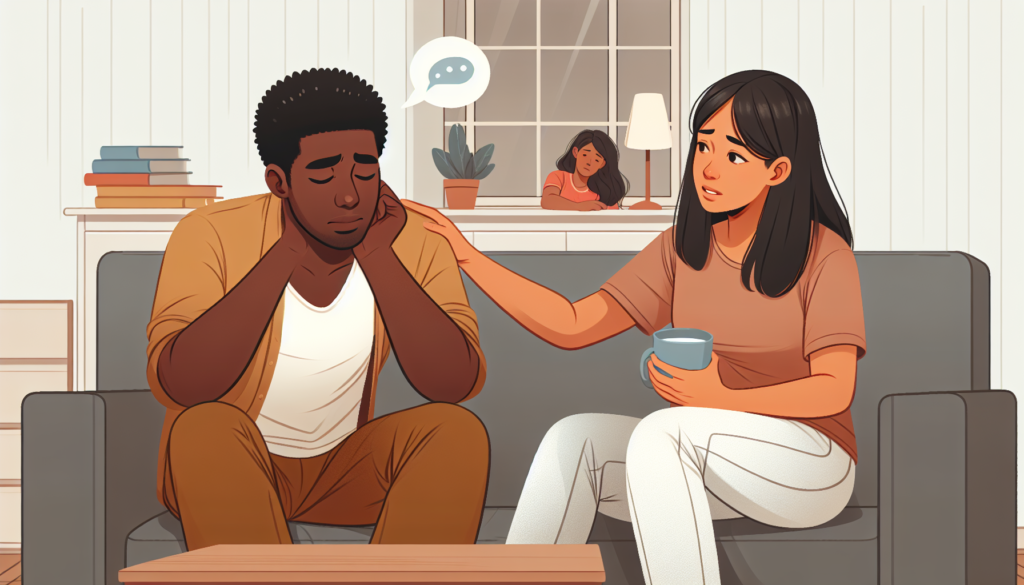Living with narcolepsy can have a profound impact on your relationships and social life. As you navigate the challenges of excessive daytime sleepiness, sudden sleep attacks, and fragmented nighttime sleep, maintaining connections with loved ones and engaging in social activities may become increasingly difficult. From cancelled plans to misunderstood symptoms, this article explores the various ways in which narcolepsy affects relationships and social interactions, shedding light on the importance of understanding and support from both sides.

Understanding Narcolepsy
What is narcolepsy?
Narcolepsy is a neurological disorder that affects the brain’s ability to regulate sleep-wake cycles. It is characterized by excessive daytime sleepiness, sudden bouts of falling asleep, and disrupted nighttime sleep. People with narcolepsy often experience vivid dreams and a loss of muscle control, known as cataplexy, triggered by strong emotions. This condition can significantly impact daily life, relationships, and social interactions.
Causes and symptoms of narcolepsy
The exact cause of narcolepsy is not yet fully understood, but researchers believe it may involve both genetic and environmental factors. One theory suggests that narcolepsy is caused by a deficiency of hypocretin, a chemical in the brain that helps regulate wakefulness. Certain genetic variations can increase the vulnerability to narcolepsy.
The primary symptom of narcolepsy is excessive daytime sleepiness (EDS), which can cause severe fatigue and a strong urge to sleep throughout the day. People with narcolepsy may also experience sudden loss of muscle tone or cataplexy, hallucinations, sleep paralysis, and disrupted nighttime sleep.
Impact of narcolepsy on daily life
Living with narcolepsy can present numerous challenges on a daily basis. The constant battle with excessive daytime sleepiness leads to difficulties in staying awake and alert during work or social activities. Simple tasks such as driving, cooking, or even holding a conversation can become overwhelming.
The unpredictable nature of narcolepsy symptoms often leads to frustration and feelings of guilt, as individuals may need to cancel plans or withdraw from activities at the last minute. The impact of narcolepsy on daily life cannot be underestimated, affecting not only the individual with the condition but also their relationships, social life, and overall well-being.
Challenges in Relationships
Lack of awareness and understanding
One of the biggest challenges individuals with narcolepsy face in their relationships is the lack of awareness and understanding from others. Many people are unfamiliar with narcolepsy and its symptoms, which can lead to misconceptions and judgment. It is crucial to educate loved ones about the reality of narcolepsy to foster empathy, compassion, and support.
Difficulty in maintaining regular sleep schedules
The irregular sleep patterns associated with narcolepsy can disrupt not only the affected person’s sleep but also the sleep of their partner or family members. People with narcolepsy may need to adhere to a strict sleep schedule, which may involve napping during the day. This can be challenging for those living in close quarters, as it may disturb the sleep routines of others.
Effects of excessive daytime sleepiness on interactions
Excessive daytime sleepiness can significantly impact social and interpersonal interactions. Individuals with narcolepsy may struggle to stay awake and engaged during conversations, leading to misunderstandings or feelings of disinterest. It is important for loved ones to be patient and understanding when their partner or family member with narcolepsy experiences moments of drowsiness or inattention.
Struggles to participate in social activities
Narcolepsy can make it challenging to participate in social activities, as individuals may feel fatigued, have difficulties remaining awake, or fear experiencing embarrassing symptoms in front of others. This can lead to feelings of isolation, as the affected person may avoid social situations altogether to prevent these challenges from arising. Finding ways to adapt activities to accommodate the needs of individuals with narcolepsy can make a significant difference in their ability to participate and feel included.
Communication and Support
Importance of open and honest communication
Open and honest communication is vital in any relationship, but it becomes even more crucial when dealing with narcolepsy. Individuals with narcolepsy should share their experiences, symptoms, and challenges with their loved ones to ensure understanding and support. Likewise, loved ones should express their concerns, ask questions, and actively listen to the person with narcolepsy to foster a strong sense of connection and empathy.
Educating family and friends about narcolepsy
Raising awareness and educating family and friends about narcolepsy is essential for building a supportive network. Providing information about the condition, its symptoms, and treatment options can help dispel misconceptions and promote understanding. Sharing personal stories, articles, or brochures can be effective ways to inform loved ones about the realities of living with narcolepsy.
Building a support system
Having a strong support system in place is crucial for individuals with narcolepsy. Surrounding themselves with understanding family members, friends, and healthcare professionals can provide the necessary emotional and practical support. Encouraging loved ones to attend support group meetings or therapy sessions together can foster a sense of unity and shared understanding.
Exploring counseling and therapy options
Counseling and therapy can provide a safe space for individuals with narcolepsy to address emotional and psychological challenges. Therapy sessions can help individuals cope with the emotional impact of living with a chronic condition, manage stress, and improve communication skills. Couples or family therapy may also be beneficial in fostering stronger relationships and addressing any specific challenges related to narcolepsy.
Intimacy and Sexual Relationships
Impact of narcolepsy on sexual intimacy
Narcolepsy can have a significant impact on sexual intimacy for both the affected individual and their partner. Excessive daytime sleepiness and disrupted sleep patterns can lower energy levels and interfere with the ability to engage in sexual activities. Additionally, the emotional strain and stress associated with narcolepsy can create challenges in maintaining a satisfying and fulfilling sexual relationship.
Managing fatigue and medication side effects
Fatigue caused by narcolepsy may lead to reduced sexual desire and stamina. However, managing fatigue through proper sleep hygiene, regular napping, and finding the right medication regimen can help mitigate these challenges. It is important for individuals with narcolepsy and their partners to communicate openly about their needs, limitations, and any side effects of medication that may impact sexual intimacy.
Effective communication and mutual understanding
Open and honest communication is crucial in maintaining a healthy sexual relationship when one partner has narcolepsy. Discussing expectations, concerns, and finding alternative ways to express physical affection can help ensure both partners feel understood and supported. Regular conversations about the impact of narcolepsy on sexual intimacy can foster mutual understanding and lead to creative solutions for maintaining intimacy and connection.
Seeking professional help if needed
If challenges related to narcolepsy significantly impact sexual intimacy or cause distress within the relationship, seeking professional help can be beneficial. Sex therapists or couples’ counselors can provide guidance, support, and techniques to address specific concerns related to narcolepsy and its impact on sexual relationships. These professionals can help couples navigate the unique challenges they face and develop strategies for maintaining a fulfilling intimate connection.

Social Life and Engagement
Challenges in maintaining an active social life
Narcolepsy can present various challenges when it comes to maintaining an active social life. The unpredictable nature of excessive daytime sleepiness and the need for regular naps can make it challenging to commit to social activities or events. Individuals with narcolepsy may also worry about experiencing embarrassing symptoms, such as sudden sleep attacks or cataplexy, in front of others.
Strategies for managing narcolepsy symptoms in social settings
There are several strategies individuals with narcolepsy can employ to manage their symptoms in social settings. Planning activities during the times of day when they typically feel most awake can help maximize their energy levels. Taking short, planned naps before social engagements or ensuring proper rest beforehand can also make a significant difference. Additionally, communicating the need for understanding and accommodation with friends and family can help create a supportive environment.
Exploring alternative social activities
If traditional social activities prove challenging, individuals with narcolepsy can explore alternative ways to connect with others. Engaging in low-energy activities such as board game nights, movie marathons, or virtual social gatherings can provide opportunities for social interaction without placing excessive strain on energy levels. Finding hobbies or groups that share similar interests can promote a sense of belonging and create opportunities for meaningful connections.
Joining narcolepsy support groups and communities
Joining narcolepsy support groups and communities is an excellent way for individuals to connect with others who understand their experiences and challenges. These groups offer a safe space to share stories, seek advice, and find support from individuals who can relate to the reality of living with narcolepsy. Engaging in online forums, attending local support group meetings, or participating in fundraising events can provide a sense of community and support for individuals with narcolepsy.
Work and Career
Navigating challenges in the workplace
Holding down a job can be particularly challenging for individuals with narcolepsy, as the symptoms can interfere with productivity, concentration, and overall job performance. Navigating the challenges in the workplace requires open communication with employers and colleagues about the condition and potential accommodations that can enhance productivity and work-life balance.
Seeking accommodation for narcolepsy symptoms
The Americans with Disabilities Act (ADA) provides legal protection for individuals with narcolepsy in the workplace. This legislation requires employers to provide reasonable accommodations to enable individuals with disabilities, including narcolepsy, to perform essential job functions. Accommodations may include flexible work schedules, access to a designated nap area, or modified tasks to accommodate energy levels.
Balancing work and rest
Finding a suitable balance between work and rest is crucial for individuals with narcolepsy. It is essential to prioritize self-care and ensure sufficient rest breaks throughout the workday to manage symptoms effectively. Establishing a routine sleep schedule outside of work hours and implementing healthy sleep hygiene practices can help maintain overall well-being and productivity.
Exploring self-employment or flexible work options
For some individuals with narcolepsy, traditional employment may not be a viable option. Exploring self-employment or flexible work arrangements that allow for greater control over work hours and rest breaks can provide individuals with the flexibility they need to manage their symptoms effectively. Freelancing, telecommuting, or starting a home-based business are potential alternatives that individuals with narcolepsy can consider.
Effects on Emotional Well-being
Impact of narcolepsy on mental health
Living with a chronic condition like narcolepsy can have a significant impact on an individual’s mental health. The challenges and limitations imposed by narcolepsy can lead to feelings of frustration, anxiety, depression, and low self-esteem. It is essential to prioritize mental health and seek appropriate support to manage these emotional challenges effectively.
Managing feelings of frustration, embarrassment, and guilt
Feelings of frustration, embarrassment, and guilt are common emotional reactions for individuals with narcolepsy. Coping with the limitations imposed by the condition and managing the impact on daily life can be emotionally taxing. Seeking support from loved ones, therapy, or support groups can help individuals navigate and manage these difficult emotions.
Seeking therapy or counseling for emotional support
Therapy or counseling can be beneficial for individuals dealing with the emotional impact of narcolepsy. A mental health professional can offer a safe space to discuss feelings, develop coping strategies, and provide support in managing the emotional challenges associated with the condition. Therapy can help individuals develop resilience, explore self-acceptance, and learn effective techniques for managing stress and emotional well-being.
Incorporating stress management techniques into daily life
Stress management techniques play a crucial role in improving emotional well-being for individuals with narcolepsy. Engaging in activities such as meditation, deep breathing exercises, yoga, or journaling can help reduce stress levels and promote relaxation. Finding healthy outlets for emotions, engaging in hobbies, and maintaining a support network are also important components of promoting emotional well-being.
Coping Strategies
Medical treatments and lifestyle changes
Medical treatments, such as prescribed medications or stimulants, can help manage the symptoms of narcolepsy. Working closely with a healthcare professional, individuals can find the right medication regimen to address excessive daytime sleepiness and other associated symptoms. In addition to medication, lifestyle changes, such as establishing a regular sleep schedule, can significantly improve symptoms and overall well-being.
Establishing a regular sleep schedule
Establishing a regular sleep schedule is essential for individuals with narcolepsy. Going to bed and waking up at consistent times can help regulate sleep patterns and improve the quality of sleep. Minimizing daytime napping, avoiding stimulating activities close to bedtime, and creating a relaxing bedtime routine can also contribute to better sleep hygiene.
Building healthy sleep habits
In addition to maintaining a regular sleep schedule, building healthy sleep habits can further support individuals with narcolepsy. Creating a sleep-friendly environment by keeping the bedroom dark, quiet, and at a comfortable temperature can promote a restful sleep. Limiting the use of electronic devices before bedtime and avoiding caffeine and heavy meals close to sleep time can also improve sleep quality.
Meal planning and exercise for overall well-being
Meal planning and regular exercise can significantly contribute to overall well-being for individuals with narcolepsy. Consuming a balanced diet that includes whole grains, fruits, vegetables, and lean proteins can help optimize energy levels. Regular physical activity, such as walking, swimming, or yoga, can promote better sleep, reduce stress, and boost overall health.
Seeking Professional Help
Importance of consulting healthcare professionals
Consulting healthcare professionals is vital for individuals with narcolepsy to receive appropriate diagnosis, information, and treatment options. Sleep specialists or neurologists who specialize in sleep disorders can provide valuable insights and guidance in managing narcolepsy symptoms effectively.
Diagnosis and treatment options for narcolepsy
Accurate diagnosis of narcolepsy is crucial for individuals to receive appropriate treatment. Diagnosis typically involves a comprehensive evaluation, including a physical examination, medical history, and sleep studies, such as a polysomnogram and multiple sleep latency test. Treatment options may include medication, behavioral therapy, and lifestyle modifications tailored to the individual’s specific needs.
Working with sleep specialists and therapists
Working with sleep specialists and therapists is essential for individuals with narcolepsy to optimize their treatment and manage the condition effectively. Sleep specialists can help fine-tune medication regimens, provide guidance on healthy sleep habits, and monitor individual progress. Therapists can offer support, guidance, and coping strategies to address the emotional and psychological challenges associated with narcolepsy.
Accessing support groups and resources
Joining support groups and accessing available resources can provide individuals with narcolepsy with the necessary support and information to navigate the challenges they face. Online support groups, websites, and social media platforms can connect individuals with narcolepsy to others facing similar experiences. Local organizations or advocacy groups dedicated to narcolepsy can also offer valuable resources, educational materials, and opportunities for engagement.
Supporting a Loved One with Narcolepsy
Understanding the challenges faced by individuals with narcolepsy
Supporting a loved one with narcolepsy starts with understanding the challenges they face. Educating oneself about narcolepsy, its symptoms, and its impact on daily life can foster empathy, compassion, and patience. Acknowledging and validating the difficulties the person with narcolepsy encounters is crucial in providing meaningful support.
Providing emotional support and reassurance
Providing emotional support and reassurance to a loved one with narcolepsy is essential. Encouraging open communication, actively listening without judgment, and expressing understanding can make a significant difference in their emotional well-being. Being empathetic, patient, and offering encouragement and reassurance can help alleviate feelings of frustration or isolation.
Helping with daily chores and tasks
Living with narcolepsy can be physically and mentally draining, making it challenging to keep up with daily chores and tasks. Offering assistance with household chores, errands, or childcare responsibilities can help ease the burden for individuals with narcolepsy. Taking on additional responsibilities without being asked can demonstrate support and contribute to a sense of shared responsibility in the relationship.
Encouraging and facilitating treatment and self-care
Encouraging a loved one to prioritize their treatment and self-care is crucial for managing their narcolepsy effectively. Providing reminders to take medication, assisting with scheduling doctor’s appointments, or helping create a sleep-friendly environment can promote adherence to treatment plans. Encouraging self-care activities, such as exercise, stress management techniques, and pursuing hobbies, can contribute to their overall well-being.
In conclusion, living with narcolepsy presents unique challenges that can significantly impact relationships, social life, and overall well-being. Understanding the condition and its symptoms is key to providing support and nurturing meaningful connections. By fostering open communication, seeking professional help, and implementing coping strategies, individuals with narcolepsy can effectively manage their symptoms and lead fulfilling lives while receiving unwavering support from their loved ones.
